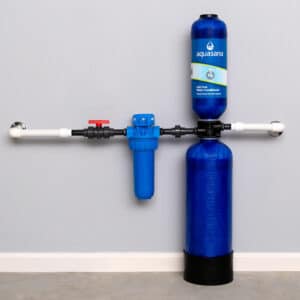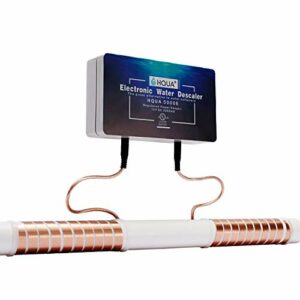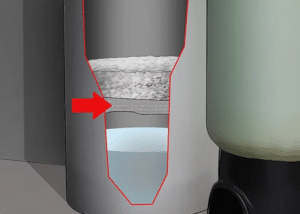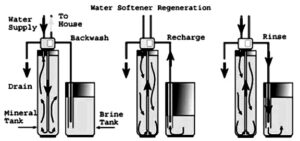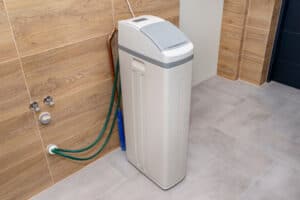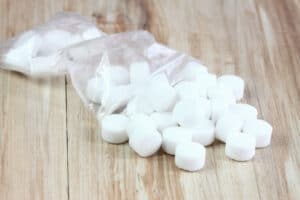There are two primary variations of water; hard water vs. soft water. Understanding which one you have will put you in an advantageous position to make the most out of your water supply.
Differences Between Hard Water vs. Soft Water
- Soft water contains more sodium.
- Hard water contains more calcium and magnesium.
- Hard water can leave spots on glasses, whereas soft water will not.
- Hard water is generally prevalent in places with worse water pressure.
- Soft water tends to promote a lot of lather for clothes and dishes.
- Soft water cleans your clothes better.
- Soft water sometimes tastes saltier.
Related: Benefits of Water Softener
What is Hard Water?
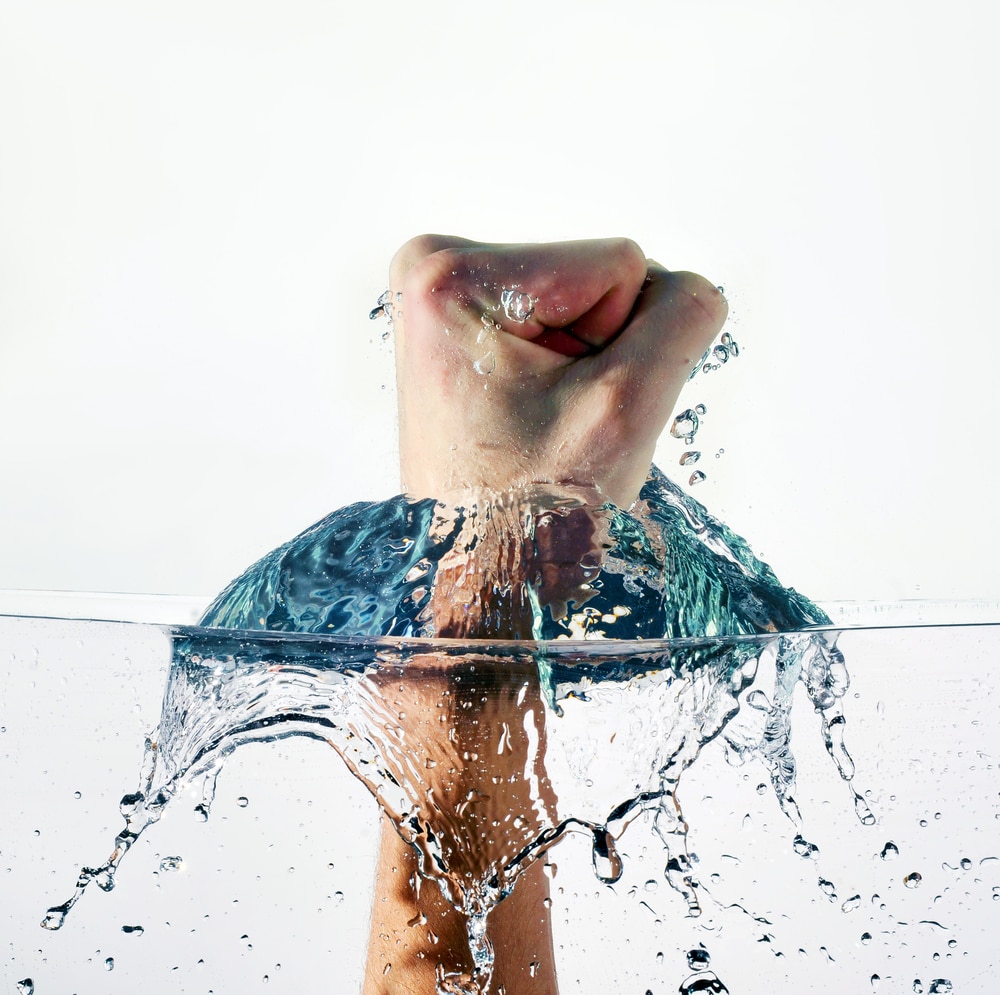
Hard water tends to have higher magnesium and calcium levels and is higher in minerals in general. It’s the direct result of water moving through gypsum, chalk, or limestone, and some people even say that it’s healthier for you than soft water. A common misconception about hard water is that you only have it if you live in a rural place. That’s simply not true. City dwellers can have hard water as well. It all depends on what’s happening in your pipes.
Hard water is very safe to drink, and you can undoubtedly launder your clothes and wash yourself in it. On the other hand, it can stain bathtubs or sinks and even hurt your clothes over time. People who have hard water in their homes often find that their water bills are higher because it’s more difficult to get hard water out of the taps, and the water pressure is relatively low.
Advantages of Hard Water
There are plenty of advantages of hard water, and while many of them are entirely subjective, there are a few universal truths as well. Most people agree that hard water simply tastes better than soft water. It has a lower sodium count, which might account for its delicious taste.
Hard water can also help your bones and teeth stay healthy due to the plethora of minerals it contains. Those who brush in hard water should notice a perceptible difference in their dental hygiene. Hard water also promotes digestive health and can stave off problems like constipation.
Disadvantages of Hard Water
Most people have a hard time getting a good lather going with hard water. Washing your clothes, body, or hair can sometimes leave a sticky film, almost like soap scum. Hard water can also leave stains on clothes, sinks, and tubs. It’s tougher to clean bathroom areas that use hard water. Many people say that their glass shower doors often look cloudy or scummy because of the hard water.
Hard water also has a serious impact on your skin and hair. Hard water can make hair feel rough and look frizzy as a result of the mineral build-up. Those who wash their hair in hard water often have to use a clarifying shampoo or apple cider vinegar treatment to remove the scum. Similarly, hard water has a rough impact on your skin and can make it very dry.
Hard water can hurt your pipes as well. As the minerals flow through the pipes, they tend to congest them, making it harder for the water to flow and corroding the pipes eventually. Hard water is defined explicitly as water that has more than 120mg of calcium carbonate per liter of water.
What is Soft Water?
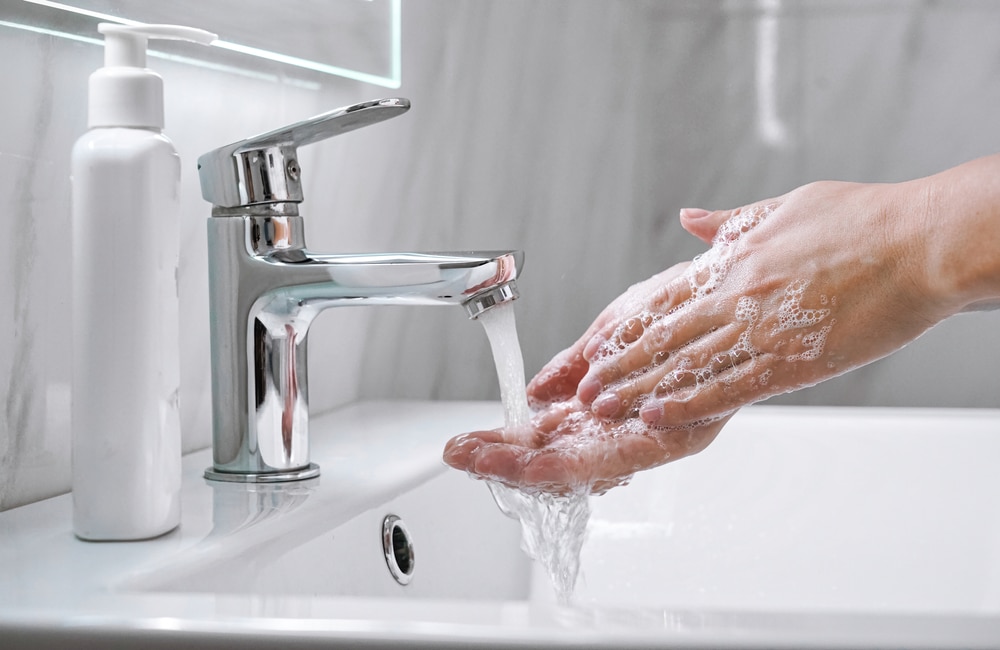
Soft water doesn’t contain the minerals that hard water has, which makes it a lot less harsh on your appliances, skin, and hair. Instead, it contains far more sodium than hard water. When it comes to choosing which water is best for you, most people prefer soft water and even go as far as to buy water softeners for their home.
Soft water is much higher in sodium, which can sometimes lead to a salty aftertaste. Many people prefer drinking hard water vs soft water.
Advantages of Soft Water
There are plenty of advantages to soft water. It’s a lot kinder to your pipes than hard water, as it won’t build up in the plumbing like hard water is more likely to do. You will also save money if you have soft water. Many people find that hard water raises their water bills and also that they have to clean more frequently to get rid of the soap scum that accumulates in their bathrooms.
Your laundry will look better, and your skin and hair will as well. Soft water is much better for hair than hard water, which can leave a film on your locks. Instead, soft water helps your hair to look shiny and gorgeous. Most people like bathing in soft water, as it helps them to feel squeaky-clean after the shower.
Disadvantages of Soft Water
Although soft water certainly has its advantages, there are a few disadvantages as well. One of the most prominent ones is that it’s not as healthy for you as hard water. Hard water contains certain minerals that help your bones and teeth, whereas soft water is composed mostly of sodium and can be dangerous for high blood pressure people.
Humans are not the only animals affected by soft water. This type of water poses risks to your plant life and can even stunt your plants if they are exposed to too much of it. If you have soft water in your home, it’s a good idea to water your plants with bottled water. You absolutely should never use soft water in your aquarium, either, especially with freshwater fish.
Soft water is classified as water that has between 0 to 60mg of calcium carbonate per liter.
Related: What is a Water Softener and How Does It Work?
Hard Water vs. Soft Water on Hair
One of the biggest questions in the debate of hard water vs. soft water is how it impacts your hair. Hard water is notoriously hard on your locks, leaving plenty of chemicals and minerals trapped in your hair. This can leave it looking either greasy or unwashed, and you need to use a clarifying shampoo to remove the hard water from your hair entirely.
Hard water can also hurt your scalp, leaving it itchy and prone to rashes. Some people who shower with hard water notice that they have a lot of dandruff. It’s best to do regular treatments for your hair if you have hard water in your home. Hard water can also negatively impact chemically-treated hair, stripping it of its color.
Soft water is more moisturizing than hard water, and it’s better for your hair. Some people even think that soft water leaves their looks looking glossier over time. On the other hand, too much salt in the water can leave your hair looking limp, so it’s good to strike a balance between the two.
Related: Water Filter vs Water Softener: What’s the Difference?
How to Tell Which Water You Have
If you’re curious as to which type of water you have, it’s relatively easy to figure it out! There are a few steps that you can take to determine whether you have hard or soft water. First, wash your hands in the water. Do you feel like there’s a slight film on them? If so, you probably have hard water. The film is simply a combination of soap and the calcium that’s inside the water.
Secondly, see how your hair and skin feel after taking a shower. If you feel the same filminess or a type of buildup, you most likely have hard water. Look at your glassware and silverware. Hard water causes spots to form on your dishes, and soft water does not. If you have mineral stains on your clothes or discover that your water pressure seems to be low, you most likely have hard water.
On the other hand, if your water pressure is good, you probably have soft water. If you can get up a good lather when you’re washing, that’s a sign of soft water too. Finally, how does your water taste? Soft water has a slightly saltier taste than hard water. That’s an excellent way to determine the type of water that you are dealing with.
Related: Well Water Vs. City Water (Public Water)
Frequently Asked Questions
If you’re still not sure, or if you have additional questions about what exactly makes up your water, these frequently asked questions should put you on the right track to deducing exactly what kind of water you have flowing through your pipes at home.
It really depends on how soft your water actually is. Soft water tends to be much higher in sodium, which can cause significant problems for people who have diabetes or who have high blood pressure. If you are impacted by excess sodium and have soft water in your home, it’s best not to drink salt water straight from the tap. Instead, invest in a sound water filtration system or buy bottled water.
Most of the time, soft water is relatively safe to drink. Many people who have soft water in their homes actually have a kind that doesn’t contain high amounts of sodium. The only time when you really have to worry is if you buy a water softener because through the chemical process of converting hard water to soft, extra sodium is added. If you’re ever in doubt, it’s a good idea to get your water tested for sodium levels. If they’re low enough, go ahead and have a glass!
Hard water is actually fine to drink, and in most cases, can be a lot healthier than soft water due to its high mineral content. Hard water can work wonders on your digestive system and help you with issues like constipation. It can also leave you feeling a lot less bloated than soft water. Since it’s full of minerals that our bodies need, like magnesium and calcium, hard water is quite helpful in specific diets.
Just like soft water, though, you can have a little bit too much of a good thing. Water that contains too many minerals might cause your body stress, but overall, it’s a good option. Although it hasn’t been totally explored yet, hard water may be a heart-healthy option for people, leading to less cardiovascular disease.
The short answer is yes; hard water can absolutely damage your hair. Many people who have hard water in their homes have to work to ensure that their hair and skin are both protected from the water itself. Some people install new showerheads or water softeners in their bathrooms.
Hard water leaves a film on many things that it touches, which can lead to mineral buildup in your hair. Some people who wash their hair in hard water feel like they’re not fully clean, even when they’re right out of the shower. There are several ways that you can combat the effects of hard water in your bathroom.
Get a clarifying shampoo that removes many minerals from your hair and will leave it looking silkier and nicer. You can also rinse your hair with bottled water at the end of your shower or use apple cider vinegar to remove any mineral impurities. If you have color-treated hair, you need to be especially careful. Make sure that you’re using protective shampoos that will keep your locks fresh.
Soft water can sometimes feel slimy because of its high sodium content. While hard water has calcium and magnesium ions, soft water has sodium ions. Some soft water is simply bursting with sodium, although most varieties are not nearly that salty. If you have very soft water, it might feel slimy. It might also make your hair feel a little slimy after you shower in it.
Although soft water is usually better in the shower than hard water, some people find that they have too much of a good thing. If your water is too soft, you can always follow the same steps advised for those dealing with hard water. Use a clarifying shampoo or treatment, and consider rinsing off your hair in bottled water after you get out of the shower. That should do the trick and remove any lingering salt from your locks.
Most rainwater tends to be soft by nature, but it is also a lot more acidic than anything that might come out of your tap. If you live in certain areas, your rainwater might actually be hard, though, depending on how much carbonic acid is in the water itself. It really depends on the area of the world that you live in.
If you’re curious, you can always do the same test that you do with your water at home. See how your hair feels after being out in a rainstorm, or even wash your hands in it.
If you over soften the water, you risk making it way too high in sodium and can even add a dose of chlorine to your drinking water. Over softened water is simply not safe to drink, so make sure that you do your research before softening your water. You want it to be optimally softened, not over softened, so if you have to, consult an expert.
It’s a good idea to know precisely how hard your water is before you try to soften it too. Only soften enough to correct the hardness in your water. Going overboard can undoubtedly be too much of a good thing!
You can undoubtedly drink boiled softened water, but there really isn’t much of a reason why you need to boil it in the first place. Most soft water is perfectly safe to drink.
If you are living or traveling in a place where water isn’t potable, you need to boil your water before drinking it to remove impurities. This is mostly to get rid of harmful bacteria from the water supply and not counterbalance any hardness or softness in the water.
In short, don’t boil your water just because it’s soft, but always boil your water, or get bottled water if you’re not sure what kind of water supply you are dealing with. When in doubt, it’s always better to opt for the safer choice; otherwise, you could wind up with a nasty bug or illness.
Understanding whether you have soft water or hard water can help you manage your home better and live a healthier life. It can also help you protect your plants and animals, most of whom should not consume soft water. Knowing the difference can allow you to understand how to properly take care of your clothes and keep your skin and hair looking nice as well.
These days, you can always change your water’s composition simply by using a water softener or balancing the Ph of the water in various ways.

